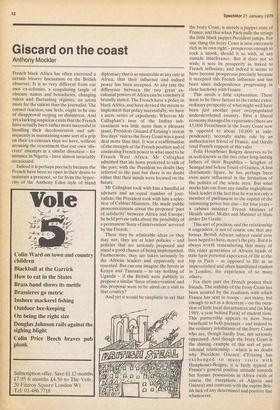Giscard on the coast
Anthony Mockler
French black Africa has often exercised a certain bizarre fascination on the British observer. It is so very different from our own ex-colonies, a coagulating tangle of obscure names and boundaries, changing rulers and fluctuating regimes, an arena more for the satirist than the journalist. The correct reaction, one feels, ought to be one of disapproval verging on disinterest. And yet a lurking suspicion exists that the French have actually been rather more successful in handling their decolonization and subsequently in maintaining some sort of a grip on their ex-colonies than we have, without arousing the resentment that our own 'discreet' attempts in a similar direction — for instance in Nigeria — have almost invariably occasioned.
Indeed it is perhaps precisely because the French have been so open in their desire to maintain a presence, so far from the hypocrisy of the Anthony Eden style of bland diplomacy that is so unsuitable at any rate in Africa, that their influence and indeed power has been accepted. At any rate the difference between the two great excolonial powers of Africa can be concisely if brutally stated. The French have a policy in black Africa, and have devised the means to implement that policy successfully; we have a mere series of expedients. Whereas Mr Callaghan's tour of the Indian subcontinent was little more than a pleasant jaunt, President Giscard d'Estaing's recent five days' visit to the Ivory Coast was a good deal more than that. It was a reaffirmation of the strength of the French position and of continuing French power in what used to be French West Africa. Mr Callaghan admitted that his hosts preferred to talk of the past; with the President no doubt they referred to the past but there is no doubt either that their minds were focused on the future.
Mr Callaghan took with him a handful of advisers and an equal number of journalists; the President took with him a selection of Cabinet Ministers. He made public pronouncements about the proposed 'pact of solidarity' between Africa and Europe; he held private talks about the possibility of a permanent 'force of intervention' serviced by the French.
These may be admirable ideas or they may not; they are at least policies — and policies that are seriously proposed and stand a good chance of being implemented. Furthermore, they are taken seriously by the African leaders and apparently not resented. But can one imagine the furore in Kenya and Tanzania — to say nothing of Uganda — if the British were publicly to propose a similar 'force of intervention' and this proposal were to be aired on a visit to that country?
And yet it would be simplistic to say that the Ivory Coast, is merely a puppet state of France, and that when Paris pulls the strings the little black puppet President jumps. For one thing the Ivory Coast is now extremely rich in its own right — prosperous enough to cock a snook, should it so wish, at any outside interference. But it does not so wish; it sees its prosperity as linked to French influence; and indeed it seems to have become prosperous precisely because it accepted this French influence and has been since independence progressing in close harmony with France.
This needs a little explanation. There seem to be three factors in the rather extraordinary prosperity of what might well have been just another poor overpopulated underdeveloped country. First a liberal economy managed by expatriates (there are 45,000 Frenchmen in the Ivory Coast now as opposed to about 10,000 at independence); secondly stable rule by an authoritarian friend of France; and thirdly total French support of this ruler.
Felix Houphouet Boigny deserves to be as well-known as the two other long-lasting fathers of their Republics — Senghor of Senegal and Sekou Toure of Guinea. A less charismatic figure, he has perhaps been even more influential in the formation of the politics of the whole area. But what marks him out from any similar anglophone black leader is the fact that he was not only a member of parliament in the capital of the colonizing power but also — for four years — a cabinet minister: French Minister of Health under Mollet and Minister of State under De Gaulle.
This sort of position, and the relationship it engenders, is not of course, one that any former British African subject could ever have hoped to have, more's the pity. But it is always worth remembering that many of this older generation of African heads of state have personal experience of life at the top in Paris — as opposed to life as an impoverished and often humiliated student in London, the experience of so many others.
For their part the French protect their friends. The stability of the Ivory Coast has been assured by the readiness with which France has sent in troops — not many, but enough to act as a deterrent — on the occasion of little local disturbances and (in May 1969, a year behind Paris) of student riots. This partnership appears to have been beneficial to both partners — and indeed to the ordinary inhabitants of the Ivory Coast who are, though hardly free, not seriously oppressed. And though the Ivory Coast is the shining example of this sort of post colonial relationship — which is no doubt why President Giscard d'Estaing has exchanged so many visits with Houphouet-Boigny, it is fairly typical of France's general positive attitude towards her former possessions in Africa (with of course the exceptions of Algeria and Guinea) and contrasts with the supine British lack of any determined and positive line whatsoever.


































 Previous page
Previous page